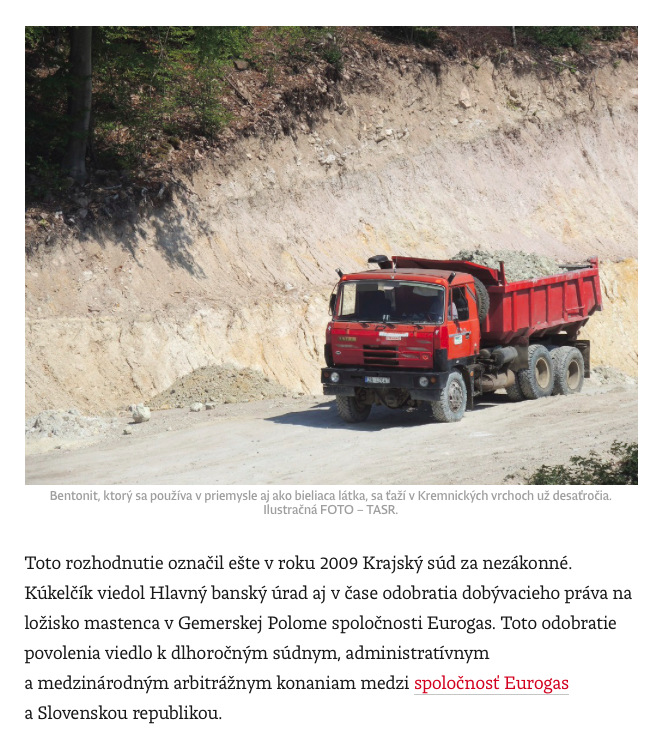Slowakisches Tages-Magazin Dennik N über Kukelcik Verfehlungen im slowakischen Hauptbergbauamt HBU in Banska Stiavnica
Hinweis auch auf EuroGas Arbitration Verfahren gegen Slowakische Republik
Behaupten SIH Trolls in deutschen Chatrooms nicht ständig, die Causa Arbitration EuroGas vs. Slowakische Republik würde in der slowakischen Presse nicht erwähnt werden ?
The state pays for mistakes, rarely holds those responsible accountable
Every employee in both the private and public spheres knows that if he or she breaches his or her duties and causes damage, he or she is liable to his or her employer. And since the employer bears that loss himself, he is entitled to seek recourse against his employee. A similar procedure applies in the case of insurance claims where the injured party’s insurer reclaims against the person at fault.
In the case of private companies, it is a matter of their internal policy to what extent and if at all they claim compensation. However, in the case of public authorities and local authorities, the level of liability (and risk) is much higher. Unlike in the private sphere, damage can also be caused by an unlawful decision or maladministration. However, not every unlawful decision automatically causes damage. This must be proved by the injured party. If the parties do not reach an agreement, the court will decide on the damages.
And since the damage is covered by public funds, it is the legal obligation of the public authorities to recover it from the responsible parties. Ministries claim recourse against the competent authorities that issued the unlawful decision. And they in turn recover it from the responsible employee. However, if the State does not claim recourse, the public will ultimately pay the damages.
Recovery of damages in practice
In the case of the Ministry of the Environment and the Ministry of Education, no damages were awarded for illegal decisions or maladministration within the competence of these ministries during the period in question.
The Ministry of Transport made a total of 17 payments as a consequence of the damage caused, with individual payments ranging from EUR 150 to EUR 6 000 (this is the principal alone). However, it has only claimed reimbursement from the responsible parties in seven cases. It did not give reasons for not claiming recourse in the remaining cases.
The Ministry of Agriculture paid for the damage seven times. The amounts involved ranged from EUR 120 000 to EUR 800 000. In five cases, it has claimed or plans to claim recourse compensation against the responsible entities. In two cases, it did not apply recourse. Paradoxically, these are precisely the cases of the lowest and highest amounts. In the case of the EUR 120, the reason given was the inefficiency of recovery, since the cost of recovery would have exceeded the damage itself.
Obligation or arbitrary discretion?
We find this reasoning questionable as it shows an arbitrary approach. The State is thereby making it clear that it will only apply recourse in the case of lower amounts, and even then only depending on the budget of the organisation responsible. Even if the public funds are ultimately from one source (the State budget), this approach may prevent the application of personal liability against the responsible employees.
In practice, in contrast to the clear legal requirements, recourse is often arbitrary and discretionary as to whether or not to apply it to the responsible parties.
As far as the Ministry of Economic Affairs is concerned, it has made only one reimbursement in the period in question. This is a long-running court case, but unlike the previous case of the Ministry of Agriculture (EUR 800 000), the court did not rule on the amount of damages at all. The sum of EUR 300 000 paid was therefore the result of a mutual agreement between the two parties to the dispute.
Hundreds of thousands for not mining
One of the highest damages awards (in non-criminal cases) over the period under review has, with few exceptions, gone unnoticed by the media. Entrepreneur, natural person Ing. Peter Majer SARMAT from Kremnica, has been mining the mineral bentonite in the Stará Kremnička mining area since 2006. In 2008, he wanted to expand the extraction of this mineral. He obtained the relevant permit from the mining authority, valid until 1 April 2025. However, in mid-2008, the Main Mining Office, headed by Petr Kúkelčík, revoked his mining permit without proper justification.
This decision was declared illegal by the Regional Court in 2009. Kúkelčík also headed the Main Mining Office at the time when the mining right for the talc deposit in Gemerská Poloma was revoked from Eurogas. This withdrawal of the permit led to years of legal, administrative and international arbitration proceedings between Eurogas and the Slovak Republic.
In the meantime, the District Mining Office notified Majer that his mining licence had expired and that the mining area would be transferred to another company. This action by the District Mining Office was also declared maladministration by the Regional Court in 2014, with the result that the entrepreneur was entitled to compensation for damages as a result of the action of that authority.
The dispute was brought before both the Supreme Court and the Constitutional Court, which upheld the Regional Court’s conclusion that the entrepreneur Majer is entitled to compensation for the illegal conduct and maladministration of the Mining Authority against the Ministry of Economy, under which the Main Mining Authority falls. However, the courts did not rule on the amount of damages.
Thus, the subject of the dispute remained only the amount of the damages and lost profits which the Ministry of the Economy should have paid on behalf of the Mining Authority. Majer first claimed damages in the amount of EUR 588 683 and later reduced the amount to EUR 439 869.
The Ministry versus the Authority
In October 2020, the victim’s lawyer sent a draft out-of-court settlement to the Ministry of Economy. In it, he put forward a proposal to settle (and end the dispute) for a final amount of 400,000 euros. This proposal was to include damages, lost profits and all legal costs incurred by the injured business.
The Ministry of Economic Affairs subsequently asked the Central Mining Authority to comment on the out-of-court settlement proposal. The Office has repeatedly commented in the past on the original requested amount of damages of EUR 588 thousand or EUR 439 thousand.
The reply of the Main Mining Authority, signed by the new Chairman, Mr Zvrškovec, on 30 October 2020, shows that even the new requested amount of EUR 400 000 does not correspond to the actual damages incurred. According to the Main Mining Authority, the injured party was permitted to extract 1 000 tonnes per year, so that in the total period under assessment the entrepreneur Majer could have extracted a maximum of 18 000 tonnes of minerals and not 383 571 tonnes, as he claims in his expert report.
According to the Authority, the injured party cannot therefore claim compensation for a greater volume of extraction than that authorised by the Mining Authority for the years 2008 to 2025. In the opinion of the newly appointed chairman of the Authority, Zvrškovec, the real damage is therefore at most in the range of approximately EUR 18 to 25 thousand.
The victim’s assessment was sufficient
„The Main Mining Authority did not have the status of a party to the proceedings. In view of the course of almost 10 years of court proceedings, the expert evidence ordered by the court (the amount of damage calculated by the expert opinion in the amount of EUR 439 869, which would be subsequently increased by the costs of the court proceedings) and the preliminary legal assessment of the case expressed by the judge, the Ministry of Economy decided to agree to conclude an out-of-court settlement in the amount of EUR 300 000,“ the Ministry replied.
They later added that the amount paid was the result of an agreement between the ministry and the entrepreneur Majer. „The ministry has also decided to enter into an out-of-court agreement in the amount of EUR 300 000 in view of the preliminary legal assessment expressed by the judge. This represents a lower financial burden than would have been the case if the judgment had been based on an expert’s report in determining the amount of damages.“
The Ministry thus appears to have been guided primarily by the expert report submitted by the victim and did not take into account the opinion of the Main Mining Authority. The following table shows the development of the amount of compensation from the point of view of all three actors.
The entrepreneur disappeared from the registers
The Ministry does not claim compensation
In November 2021, just a few weeks before the limitation period expired, we repeatedly contacted the Ministry to ask whether it had or still planned to seek recourse against the responsible party for the unlawful decision. The Ministry’s reply shows that they considered recourse but did not apply on the grounds that recourse compensation cannot be recovered because of the excessive difficulties involved in recovery (Section 22(2)(d) of Act No 514/2003 Coll.). The Ministry did not respond to our supplementary question as to what excessive difficulties in recourse recovery had been identified in this case.
According to the victim’s counsel, the person responsible for the State’s unlawful conduct in this case is Peter Kúkelčík, the former chairman of the Main Mining Authority, who is a signatory to the unlawful decision. This is a person who has long been criticised by the Minister’s SAS in the past. At one time, it even accused him of falsifying the results of an investigation into the 2009 mining accident at the Hornonitrian mines, in which 20 miners died.
The state will pay for it, that means all of us
The State’s liability for damage caused by its authorities and, consequently, its employees is currently set out in a clear legislative framework. In practice, however, there seem to be deviations from this legal procedure – the State does pay the damages, but often does not apply recourse compensation. The willingness to recourse increases as the amount of damage decreases. If recourse is not claimed, this is usually justified by reference to the wording of a paragraph of the law. The State thus loses large sums of public money because of poorly harmonised legislation and practice.

